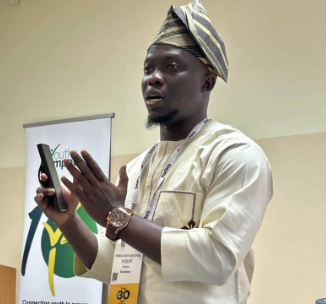By Folawiyo Adebanke
Today, at the ongoing Forbes Under 30 Summit Africa in Botswana, digital marketing expert and entrepreneur Misbaudeen Yusuff Adeshina delivered a compelling presentation at the Youth Impact Ed-tech Hack-A-Thon, held at the University of Botswana. Addressing a gathering of tech innovators, educators, and policymakers, Yusuff Adeshina tackled the pressing challenge of expanding educational access to students in rural areas with little to no internet connectivity. He introduced an innovative solution leveraging Unstructured Supplementary Service Data (USSD) technology, offering a low-cost, scalable approach to digital learning.
Emphasizing the need for accessible learning alternatives that do not rely on internet access, Yusuff Adeshina detailed how USSD technology, commonly used for mobile banking and service inquiries, could be adapted to deliver educational content via basic mobile phones. Unlike traditional e-learning platforms that require smartphones and internet data, the USSD model would enable students to access lessons, take assessments, and receive instant feedback through a simple text-based system. This approach ensures that children in remote communities can learn at their convenience rather than being restricted to fixed schedules dictated by radio or television-based educational programs.

One of the most impactful aspects of the USSD-based system is its ability to provide real-time grading and instant feedback, allowing students to assess their performance and reinforce their learning on the spot. Additionally, the platform can incorporate gamification, including weekly rankings and local leaderboards, to drive student engagement and motivation. Yusuff Adeshina underscored that the solution is not only feasible but also affordable and easy to deploy, making it a practical option for large-scale implementation in underserved regions.
During his address, he called for collaboration between technology providers, education stakeholders, and policymakers to ensure the successful rollout of the USSD learning model. He urged organizations such as Youth Impact to partner with telecommunications companies and government agencies to make the service widely accessible at minimal costs. Stressing the importance of sustainability, he emphasized that the goal is not simply to introduce new technology but to create long-term educational solutions that ensure every child, regardless of location, has access to quality learning opportunities.
Yusuff Adeshina’s presentation at the Forbes Under 30 Summit Africa highlights the growing role of low-tech innovation in addressing global educational challenges. His proposal for a USSD-powered learning model presents a transformative opportunity to bridge the digital divide and empower thousands of students in remote areas with the tools they need to succeed. As Africa continues its digital transformation, solutions like these demonstrate the potential of technology to drive inclusive, scalable, and impactful educational development.

